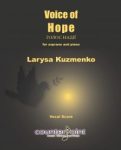$39.95
Description
Voice of Hope, soprano and piano version by Larysa Kuzmenko 2022 Dur. 9 min.
piano/vocal score
Ukrainian, phonetic Ukrainian and English (translation by Mia Bach)
Listen-audio with piano trio accompaniment
Both recordings feature soprano Natalya Gennadi
Program notes by the composer:
Voice of Hope, originally for soprano and string orchestra, opens with a dark and ominous theme presented by the strings in the high register. The music creates an atmosphere of despair and sorrow when a child sees a little bird at her window begging for food. She asks the bird to tell the world that we are dying from starvation. The music suddenly speeds up and becomes rhythmic and intense, depicting Stalin’s police gathering up all the food from the villagers and leaving families to die from hunger. The opening theme reappears in the last verse, but with a stronger sense of helplessness, as many have died. As the music intensifies, it reaches a dramatic climax with the words “But we as a people will not give up, we have not died, we are still alive.”
The Famine-Genocide occurred as a result of direct Soviet policy to crush the nationally conscious Ukrainian people– especially peasants and landowners – who most fervently resisted collectivization and supported the independence of Ukraine. This terror claimed the lives of between 7 to 10 million people. The Soviet regime introduced unrealistically large quotas on grain and other agricultural products, stripping the peasants of their food supply. In August 1932, the regime authorized the confiscation of grain from peasant households and a month later enacted a law that authorized the death penalty or the “leniency” of 10 years exile for the theft of “social property” – grain and foodstuffs. The borders of Ukraine were officially sealed to prevent any migration or relief efforts. This made it difficult for the Western press to report on this catastrophe. At the same time, the Soviet regime dumped 1.7 million tons of grain on Western markets.

